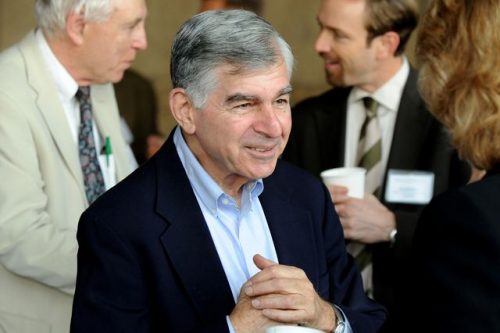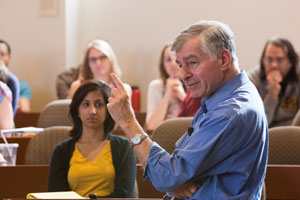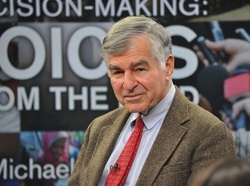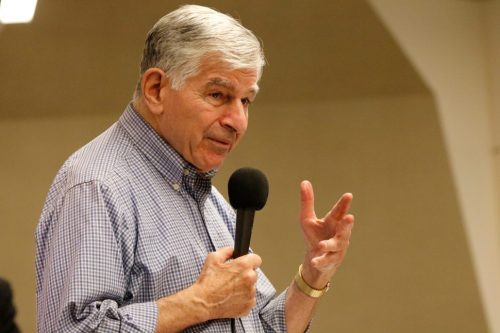March 14, 2017
By Zev Hurwitz
With second-year Luskin students searching for career opportunities and first-year students looking to lock in summer placements, the UCLA Luskin School of Public Affairs presented an alumni panel to give timely advice about what types of jobs might be out there in the public service sector.
At an evening panel discussion hosted by Luskin School Career Services on March 9, 2017, alumni of all three UCLA Luskin master’s programs spoke about working professionally with local governments and how their degrees opened those careers as possibilities.
Former Massachusetts Gov. Michael Dukakis, who has taught as a visiting professor at the Luskin School each winter for more than 20 years, spoke about the opportunities for Luskin students to engage in public service, and he challenged the audience — mostly current Luskin students — to make strides in addressing the world’s issues.
“Five-sixths of the world today is conflict-free,“ Dukakis said. “The challenge now is how do we get the remaining one-sixth to join the other five-sixths? I just hope that, in addition to everything else you’re doing, you’ll be working hard for that kind of future.”
Five UCLA Luskin alumni spoke on the panel, which was moderated by Emily C. Williams MPP ’98, a member of Luskin’s first-ever graduating Master of Public Policy class. Williams noted that the panel’s academic diversity demonstrated the value in having cross-educational opportunities for current students, and she encouraged the audience to enroll in courses in other disciplines.
“It’s really nice that we have this great array of talent from all three departments in the school,” Williams said. “What was nice, for those of us who took classes outside our department, is that we really got to know some of the people outside of our programs, which lends itself to great working relationships.”
Paul Weinberg MPP ’98 is now emergency services administrator in the Office of Emergency Managementfor the City of Santa Monica. Weinberg spoke about how his schooling — Dukakis’ course in particular — gave him important insight into professionalism.
“Always return your phone calls — I cannot tell you how important that is,” Weinberg said. “You’ve got to find a way to acknowledge people reaching out to you,” attributing that advice to Dukakis. “Also, never say or write anything you don’t want to see on the cover of the L.A. Times. If you think about that now, that is more important than ever because [if] you put something out there in social media, it’s everywhere.”
Nahatahna Cabanes MSW ’13 is director of the Retired and Senior Volunteer Program at L.A. Works. As a former Bohnett Fellow, Cabanes had the opportunity to work in the administration of former L.A. Mayor Antonio Villaraigosa while a student at Luskin. She said her current job is different from her role in the mayor’s office, but both jobs speak to her interests.
“It’s because I’m a little bit bipolar in term of my interests that I still have the compassion that drove me to social work, but at the same time, I’m a community organizer at heart and I love the world of politics,” Cabanes said. “I sort of balance between the macro and the micro.”
Molly Rysman MA UP ’05 is now the housing and homelessness deputy for Los Angeles County Supervisor Sheila Kuehl. Rysman discussed her experience bringing a priority issue to the mainstream of local politics.
“When I joined [Rysman’s] office, I worked really hard during her campaign to educate both her and her challenger that homelessness was an important issue — because back then you had to actually tell elected officials to care about homelessness,” she said. “Now I get to work on an issue that’s top of the agenda.”
Also serving on the panel were Daniel Rodman MURP ’14, now transportation manager in Mayor Eric Garcetti’s office, and Everado Alvizo MSW ’08, a former Bohnett Fellow who now works as a project coordinator and registered associate clinical social worker for Special Service for Groups.
VC Powe, director of career services and leadership development at Luskin, said that giving opportunities for current students to engage with alumni is critical in providing a realistic idea of what life after UCLA will be like.
“When we have representatives from an organization talk about their work, they’re going to give you all of the formal, appropriate ‘yes-you-need-to-know’ detailed background about the organization,” Powe said. “When you’re talking to an alum, they’re also going to give you the inside story and they’re going to be honest. The alum knows what the students have learned here, so they can tell them how to tailor their experience to the jobs they’re seeking. I think that’s a very important difference.”










